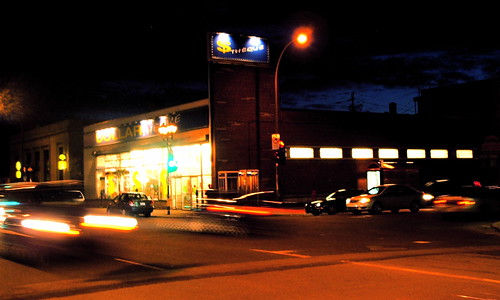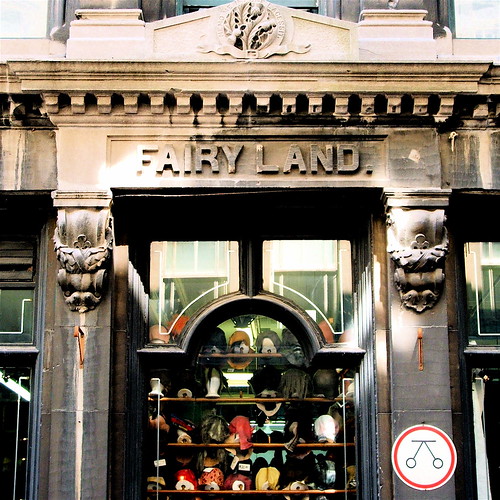Watching Rufus Wainwright's first in a row of New York shows at the Gramercy Theatre, a very intimate new venue whose old cinema appeal remains, I was only briefly distracted by the presence of the glowing and flip-flopped Maggie Gyllenhaal just across the aisle. The show featured no songs from Wainwrights first two albums, focusing on the strongest material from his Want cycle and an almost complete reading of Release The Stars, his most recent paean to beauty.
Apart from a wonderful and completely botched reading of Tulsa, his song about a one night stand with a certain Mr Flowers of The Killers, the new songs were beautifully performed, simplified from their sometimes too ornate production. The newly boyfriended Rufus especially impressed with his ode to love (and Berlin) in Tiergarten (mp3) .
With several costume changes (first a striped suit, then lederhosen, a robe, and finally just lipstick, tights, a jacket and hat), an intermission, an a capella unamplified folk song (the romantic Irish standard Macushla), and a dance routine to Wainwright's cover of Judy Garland's Get Happy, the evening certainly made me look forward to Rufus' inevitable Vegas residency.
new name, new address: neonresolutions.tumblr.com
Wednesday, June 06, 2007
Rufus Wainwright at The Gramercy Theatre, June 5th 2007
Tuesday, June 05, 2007
Unlikely Summer Jams 2007: Patrick Cleandenim/The Free Design
When I first read about Patrick Cleandenim on marathonpacks, my interest was piqued by the references to Rufus Wainwright. Though the song posted there did not immediately grab me, I did some research (it's what all the kids call scouring Youtube, honestly) and was intrigued by the Daytrotter-profile, but more so the video for So You Think You're Gonna Live Forever, all black and white and Coney island-retro.
Distributed in the US by Ba Da Bing!, suitably the same label that brought us Beirut (the band now out-Google-ranking the country it took its name from, crazy), the 21-year-old multiple media artist's album Baby Comes Home was recorded with a twelve-piece orchestra. Though some of his tunes sometimes lean towards Belle & Sebastian, Cleandenim's ambition, according to his myspace page, seems to be the more restrained Bacharachian space-age pop of David Axelrod or Joe Meek, rather than Rufus' cabaret and Garland-influenced stylings. My favorite song by Cleandenim (Patrick Clendenin Roberts from the musical city of Lawrence, Kansas), Days Without Rain (mp3), seems to have different roots than Rufus, but all the album's songs could have easily been performed by Dusty Springfield or Dionne Warwick in their heydays. With its intoxicating stop-start structure, the waltz' chorus-style vocals recall those of easy-listening records by baroque pop innovators like The Free Design.
The Free Designers (active from 1967 to 1972, and also in 2001) are admittedly a little bit more hyperactive, their Enoch Light-produced work lovingly reinvents pop-hits like California Dreamin', Happy Together and Light My Fire as orchestral pop-singalongs for modern living. Their own originals, as head on the wonderfully issued best of on Varese Sarabande, are playful and jazzy (not in the noodly, but in the unexpected and inventive sense of the word). Bubbles (mp3) is infantile in the best kind of way, preserving a sense of wonder and simple melodic joy. Though the verse reveals a child's set of worries, "ma ‘n’ pa are arguin’ again; today I lost my best friend; the kitty has a little cold; ‘n ‘ grammama is getting older, my tummy has a little pain; ‘n’ when does Jesus come again?", the overall bubble-happy sound definitely warrants its inclusion on the Powerpuff Girls soundtrack (albeit in a Dressy Bessy cover).
Rihanna's Soul Makossa
Listening to Good Girl Gone Bad, the new album by Rihanna, a singer who I'd previously only registered as just another Soft Cell-sampling RnB starlet, I realize that the gothification of pop music runs very deep. This is not about the guitars, these songs owe more to Usher's shivery synth track Yeah, it's more about the general sense of slow-burning real anger and Depeche Modey disaffected dread that seeps from between the pop songs' shiny elements. Just like Omarion's eyelinery Ice Box track, Rihanna's very gloomy summer banger Umbrella, stompingly mad new single Shut Up And Drive, or album track Breakin' Dishes (chorus: "I'm breakin dishes off your head all night, and I'm not gonna stop until I see police and lights.") reintroduce new wavy rock idioms in a similar but more danceable way than Kelly Clarkson's impossible-to-karaoke-without-shrieking Since You've Been Gone.
Posted first on the bilingual beats-blog Fluokids, and produced by Norwegian hitmeisters StarGate, who also did Beyonce' recent spate of incomprehensible hits Irreplaceable and Beautiful Liar, my favorite on Rihanna's album, Don't Stop The Music (mp3), is also the most techno. Like all great dance songs - Kylie's Can't Get You Out Of My Head, Madonna's Music and LCD Soundsystem's Losing My Edge - is deeply self-reflexive; it is a dance song about dancing and its structure thoroughly supports that. As the track's tension builds and builds, a Daft Punkian bubbling melody underneath the stomping rhythm and Rihanna's repetitive slowly reveals itself to be the "Ma-ma-ko ma-ma-sa ma-ma-ko-ssa" refrain familiar from Michael Jackson's dancefloor stormer Wanna Be Startin' Somethin. Like that forebear, this is relentless, a late night houseburner that surely deserves summer jam status.
For those who need a little late afternoon summer jamming, I suggest the afro rock classic that 'inspired' Jacko's classic. Originally written and performed by Cameroonian saxophonist Manu Dibango in 1972, Soul Makossa introduced the still-infectious chant that now powers Rihanna's track. Out of all the different versions of the influential song (reggae, rumba, house, electro), I picked this coarser-voiced version (mp3) by the Lafayette Afro Rock Band (1974), a funk outfit that fled Long Island for Paris. More angular than the song's original, this Talking Headsy version will have your BBQ parties bumping until it's time to break out the glowsticks and the Rihanna hits.
PS. Also check out Popjustice's hilarious list of one hundred things less brilliant than the new Rihanna album. My top three favorites:
49. 'Imagine' by John Lennon
People think John Lennon's some sort of lyrical genius but did he ever – EVER – come up with this line – from 'Breakin' Dishes – "I'm roasting marshmallows on the fire and what I'm burning is your attire"? No he did not.
52. Making pancakes
Having no eggs in the house will not prevent you enjoying the new Rihanna album.
68. Battlestar Galactica
Battlestar Galactica is amazing but at least the new Rihanna album won't hit you over the head with stuff about 'politics' and 'the real world' when all you want to do is watch a load of robots being blown up by fit people. Which is not to say that 'Good Girl Gone Bad' doesn't have a social conscience, because it probably does, somewhere or other.
Saturday, June 02, 2007
Unlikely Summer Jams 2007: Fleetwood Mac/The Field
One summer I took over the record store I worked at for a few months while my boss went off to India. Piccolo Records was housed in the tiniest old building. It had seen Napoleon take the city of Maastricht but would not keep standing for much longer. My tasks included covering the records in the store with plastic before I left each day. A single rainstorm would soak the store and render the beautiful records worthless. That summer, I lived every music geek's High Fidelity dream. Though many people would say that the most power lies in merely lounging imperiously behind the counter and occasionally deigning to answer questions by the humble clientele, my experience taught me that the greatest pleasure a record store employee can have is to put on a record and have it bought right off the store's shiny Technics 1200.
Those days I just grabbed random records from the racks, discovering Meat Loaf and the Bee Gees surprisingly palatable early work, but never quite getting into Beefheart or Zappa. To my surprise though, the record that was sold straight off my turntable the most was the multi-million selling album Rumours by Fleetwood Mac. Though it has in the past been written off as a commercial easy listening album, it is luminously produced, never over-stuffed, but also not cliched in its casual instrumentation. The ideal record to put on as I opened the store, propped the door open, and started to remove the plastic sheeting off the racks (just because it is July, sunny even, does not mean that it never rains during fickle Dutch summers).
The more than 30 million-selling Rumours (1977) is stuffed with anthemic pop singles, Clinton-campaigner Don't Stop, devastating Karaoke beast Go Your Own Way, and the sultry groove of Dreams. The appeal of the album version of fan-favorite Gold Dust Woman lies in the way Stevie Nicks' other times too-unbridled symbolism and floatiness has been contained, paced-out, harnessing its vicious power without exactly revealing the song's subject (jealousy? drugs? break-ups?). The sparse demo I'm posting is much tighter but less menacing. My main interest is in its surprisingly sweet coda, which sounds almost exactly like the poignant, wordless warbling than underscores the dramatic scenes on the Gilmore Girls.
More summer stompers can be found of the Mac's weirdest album, the wonderful Tusk (1979). Apart from the insane title track (background noise, African drumming, spooky vocals, and of course a brass band finale), and Stevie's sprawling swamp of a song, Sara, it also features the very Don't Stop-ish Think About Me , which I've posted in the single version off the expanded re-issue. As with Fleetwood Mac's most powerful stuff (and, now that I think about it, Abba's work as well), this song works best in its juxtaposition of upbeat sound and loose rhythm, with more pointed, dark lyrics, probably bred from the band's fucked-up inner romantic dis-entanglements. As Arion Berger suggests in his Rolling Stone review of the Rumours reissue:
"It's not a classic breakup record; it wasn't built as a soundtrack to whatever heartbreak you're trying to sing along to. But it's their breakup record, and in its idiosyncratic way it mirrors all the lost loves of the world. The two couples confess, blame, sigh and ride a deep, chugging groove toward some kind of resolution."
For fans of later Mac, as well as those of minimalist Teutonic techno, I'll end this with a post of The Field's epic stretching of the 1987 song Everywhere, here renamed Everday. As I've attempted to describe before, the tracks produced by Stockholm's Axel Willner are a different kind of trance. The music sounds like a warmer version of a skipping song on a CD. You know, those times where you're too busy doing something to realize you've been listening to the same few seconds of your favorite song for the last hour, just because someone used that disc as a coaster. The tracks on The Field's From Here We Go Sublime album just keep on building and building, revealing tantalizing snippets of their source material, but somehow ultimately imploding that material, mining radio staples by The Four Tops, The Flamingoes, hell, even Lionel Richie's Hello, for previously unsuspected tensions and dancefloor energy.











